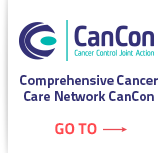Global task force tackles problem of untreatable cancers and disease relapse
Targeted therapies and the consequent adoption of “personalized” oncology have achieved notable successes in some cancers; however, significant problems remain with this approach. Many targeted therapies are highly toxic, costs are extremely high, and most patients experience relapse after a few disease-free months. Relapses arise from genetic heterogeneity in tumours, which harbour therapy-resistant immortalised cells that have adopted alternate and compensatory pathways. An international task force of 180 scientists was assembled by a Canadian NGO called “Getting to Know Cancer” to explore the concept of a low-toxicity “broad-spectrum” therapeutic approach that could simultaneously target many key pathways and mechanisms.

Interdisciplinary teams nominated a series of high-priority molecular targets (74 in total) that could be reached to improve patient outcomes in most cancers.
Corresponding low-toxicity approaches were then recommended as potential candidates for mixtures of chemical substances that could reach a broad-spectrum of priority targets in most cancer types.
Many of the substances that were selected were from plants and foods.
“We are extremely encouraged by the degree of consensus that we found within this large group of researchers” said Keith I. Block, M.D., the Medical and Scientific Director of the Block Center for Integrative Cancer Treatment in Skokie, Illinois.
“We believe that carefully designed combinations of non-toxic chemicals can be developed in a manner that will maximise our chance of arresting most cancers. Currently, clinicians have a limited number of tools to help them treat the disease once it becomes resistant to mainstream therapy, but an approach that can reach a broad-spectrum of targets without toxicity offers considerable promise”.
Block is the lead author of this synthesis which has just been published (along with the supporting work from each of the teams) in a special issue of Elsevier's peer-reviewed journal, Seminars in Cancer Biology [1].
This was the first time that this large-scale problem has ever been considered by teams that could interpret the full spectrum of cancer biology and incorporate what is now known about non-toxic chemicals with anti-cancer effects.
In light of this evidence, the task force is calling for an immediate increase in support for research on mixtures of chemicals that can reach a broad-spectrum of therapeutic targets.
“This is an area that merits considerable attention and where interdisciplinary and international collaboration is needed” said Dean Felsher, MD, PhD a project contributor from the Department of Medicine at Stanford University.
“Our approaches to therapy are improving, but we need a breakthrough that can helps us address the problem of relapse”, he added.
The taskforce wanted to produce an approach to therapy that would also have the potential to be very low cost, so this approach may hold considerable promise for low-middle income countries where many of the latest cancer therapies are deemed unaffordable.
Reference
- Block KI, Gyllenhaal C, Lowe L, et al. Designing a broad-spectrum integrative approach for cancer prevention and treatment. Seminars in Cancer Biology 2015; 35 (Suppl): S276–S304. doi: 10.1016/j.semcancer.2015.09.007
Keywords: phytochemicals, targeted therepy, cancer prevention, cancer treatment
18. 11. 2015 Saarland University Press Release



